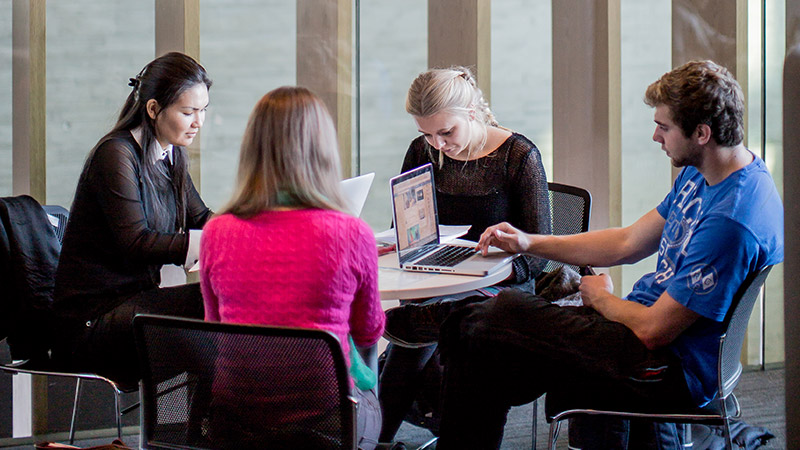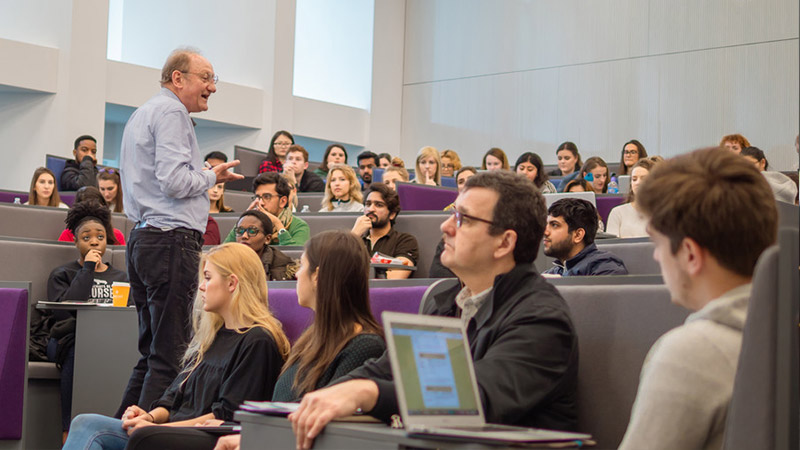International Business and Supply Chain Management
MSc
Find out more about our courses by joining a live master’s webinar
Start dates: September 2026
Full time: 1 year full time or 2 years in sandwich mode which includes one year's full-time paid supervised work experience (a work placement).
Part time: 2 years part time
Location: Headington
School(s): Oxford Brookes Business School
Overview
Study MSc International Business and Supply Chain Management and take the first step in your international career. You'll develop the knowledge, skills and adaptability to work in a commercial or a not-for-profit organisation.
The course specialism enables you to focus on the area of supply chain management and logistics. You'll study how businesses align supply chains and their logistics with their corporate strategy, and gain understanding of key decisions driven from a supply chain perspective. You'll explore different supply chain operations, and will study the core principles of Business and management to help you achieve a managerial position in an organisation.
You'll learn to identify, analyse and assess business-related issues. You'll then build the skills and develop key responses to these issues, which will inform your decision on selecting the appropriate course of action. All these skills are essential for success in the corporate world.
You'll graduate ready to be:
- a supply chain analyst
- procurement manager
- logistics specialist
- or a management consultant.

Why Oxford Brookes University?
-
Learn from experts
Professionally experienced tutors, and guest entrepreneurs and business innovation experts
-
Support
You’ll receive academic support and guidance throughout the course
-
Employability skills
Build your analytical and solution focussed skills through international case studies
-
Real world experience
Through Business Challenge week you meet and work with corporate professionals
Course details
Study modules
You have the option to undertake an optional enterprise work placement which can be valuable and help you gain relevant industry experience and develop transferable skills such as communication, teamwork, networking and problem solving. A work placement can help you decide on your long-term career objectives and may lead to a job offer after graduation (would require visa sponsorship for international students).
The WAVES (Work and Voluntary Experience Service) or Careers Office will provide you with support and advice to get ahead in your career, and help you with your CV and applications. The team has access to a wide range of small, medium and large employers that offer postgraduate student work placements.
If you wish to pursue a placement at a particular company, our WAVES team can support you in making an approach to the company. Our Careers Office can also provide you with advice on how to use professional social media channels to pitch yourself to prospective employers.
Please note: As our courses are reviewed regularly as part of our quality assurance framework, the modules you can choose from may vary from those shown here. The structure of the course may also mean some modules are not available to you.
Research
Business School academics explore core issues facing contemporary societies, ranging from refugee entrepreneurship and internationalisation to sustainable tourism, security and the changing world of work and organisations including the impact of artificial intelligence. We address questions such as:
- What characterises the interconnections of trade, transportation and technologies?
- How do we organise for security?
- How can social media address well-being and social isolation?
- How can individuals be happier and navigate the increasingly complex world of work?
We also have an expertise in Coaching and Mentoring as well as in Diversity (such as examining pay gaps and gender and spin-outs) and we are always keen to include students into our projects where possible.
Please visit our research pages to learn more about the three research centres @ /business/research/. Being a masters student at OBBS offers plenty of opportunities to be a part of our research culture.

Careers
The MSc International Business and Supply Chain Management will help you develop the knowledge and skills for roles that centre on managing supply chains, logistics, operations or other functional areas of an organisation. Typical roles might revolve around:
- Supply Chain Analyst
- Procurement Manager
- Operations Manager
- Supply Chain Coordinator
- and general manager.
This may be in commercial, non-profit or public organisations.
Many of our graduates find managerial positions at a wide range of organisations, including:
- companies producing fast moving commercial goods
- consultancy firms
- financial institutions
- retail giants
- charities
- SMEs
Recent examples of these employers include:
- Amazon
- IBM
- Deutsche Telekom
- Deloitte, KPMG, PwC, EY
- Oxfam
- BASF Group
- Kautex Unipart
- Raiffeisen Bank
- Revolution Insurance
- American Business Conferences
- Consilio Global
- Or return to their family business.
Student profiles
Our Staff
Dr Chengbo Wang
Chengbo is a senior lecturer who has undergone research into innovative strategic practices in business operations management, and is a member of the Chartered Institute of Logistics and Transport.
Read more about ChengboDr Gabor Lukacs
Gabor works as liaison manager with some of our esteemed international partners and professional and accrediting bodies, and teaches on several business and management modules.
Read more about GaborRelated courses
Entry requirements
Specific entry requirements
A minimum of a second class honours degree (2:2) in any academic discipline, or equivalent overseas degree from a recognised institution or equivalent professional or other qualification.
Applicants who possess a diploma rather than a degree may be eligible for entry provided they have compensatory work experience and can demonstrate career development.
This course attracts students from a wide range of backgrounds and nationalities. Applications are welcome from those in work and seeking continuing professional development.
Entry will also be subject to one satisfactory reference (academic).
If you’re considering submitting an application for this course, but you have more than three years of relevant work experience, why not consider applying for our Oxford Brookes Global MBA (Master of Business Administration) course? Find out more about our MBA here.
Please also see the University's general entry requirements.
English language requirements
If English is not your first language you will need to satisfy the university's English language requirements:
- IELTS minimum level 6.0, (with a minimum of 6.0 in reading and writing, and 5.5 in listening and speaking).
- If you have completed your undergraduate degree in the UK (at least one full year of study) you will automatically meet our English language requirements
Please also see the University's standard English language requirements.
Pathways courses for international and EU students
We offer a range of courses to help you meet the entry requirements for your postgraduate course and also familiarise you with university life in the UK.
Take a Pre-Master's course to develop your subject knowledge, study skills and academic language level in preparation for your master's course.
If you need to improve your English language, we offer pre-sessional English language courses to help you meet the English language requirements of your chosen master’s course.
English requirements for visas
If you need a student visa to enter the UK you will need to meet the UK Visas and Immigration minimum language requirements as well as the University's requirements. Find out more about English language requirements.
Credit transfer
Terms and conditions of enrolment
When you accept our offer, you agree to the Terms and Conditions of Enrolment. You should therefore read those conditions before accepting the offer.
International qualifications and equivalences
How to apply
Application process
Tuition fees
Questions about fees?
Contact Student Finance on:
Tuition fees
The full-time fees quoted are for the taught Year 1. Fees will be charged for the placement year in Year 2 and are available on request from finance-fees@brookes.ac.uk.
The following factors will be taken into account by the University when it is setting the annual fees: inflationary measures such as the retail price indices, projected increases in University costs, changes in the level of funding received from Government sources, admissions statistics and access considerations including the availability of student support.
How and when to pay
Tuition fee instalments for the semester are due by the Monday of week 1 of each semester. Students are not liable for full fees for that semester if they leave before week 4. If the leaving date is after week 4, full fees for the semester are payable.
- For information on payment methods please see our Make a Payment page.
- For information about refunds please visit our Refund policy page
Additional costs
Please be aware that some courses will involve some additional costs that are not covered by your fees. Specific additional costs for this course are detailed below.
Optional costs
| Additional costs | Amount (£) |
|---|---|
It’s your responsibility to cover print / binding costs where coursework submission is required. Please note that a lot of the coursework is now submitted online. |
From £30 |
| You may choose to purchase books to support your studies. Many books on our reading lists are available via the Library, or can be purchased secondhand. | £20-60 per book |
Accommodation fees in Brookes Letting (most do not include bills) |
£107-301 per week |
Accommodation fees in university halls (bills included, excluding laundry costs) |
£139-248 per week |
| CMI student membership | £330 |
Graduation costs include tickets, gowning and photography. Gowns are not compulsory but typically students do hire robes, starting at £41. |
Typically £0-200 |
International Business in Practice Study Trip module (inc. accommodation for seven nights, insurance, company visits and group transportation for all activities). This fee did not include international airfare, visa application fee (if relevant), dinners and activities during your free time. |
£2250-2500 |
Students are responsible for their own travel to and from university for classes. For the 2025/26 academic year, the University is introducing an alternative subsidised travel offer for all students with further information on our Travel webpages. |
From £10 |
Funding your studies
Financial support and scholarships
Featured funding opportunities available for this course.
All financial support and scholarships
Programme changes:
On rare occasions we may need to make changes to our course programmes after they have been
published on the website. For more information, please visit our
changes to programmes page.



